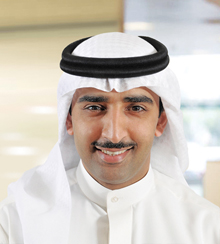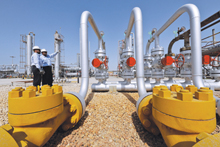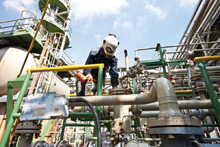
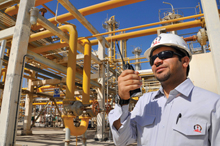 Banagas ... safety first
Banagas ... safety first
IN 2013, Banagas achieved a record 9 million man-hours worked without a lost time accident (LTA) since May 27, 2002.
The company’s outstanding occupation safety record has received international recognition with the presentation of safety awards from the Gas Processors Association of the USA and the Royal Society for the Prevention of Accidents in the UK.
In recognition of its high standards of occupational safety the company received the International Safety Award with “Merit” from the British Safety Council, “Oil and Gas Sector” Award for Occupational Health and Safety from the Royal Society for the Prevention of Accidents, “Second Place Division I” Award, Gas Processing Association-US, Silver “Stevie” Award for HSE programme of the year in Middle East and Africa and “Occupational Excellence Achievement” Award from National Safety Council of the US.
A company that processes highly flammable gases has to pay the greatest attention to occupational health and safety and right from the start of operations this has been of paramount importance. To safeguard life and property, Banagas enforces the most stringent regulations to ensure safe working conditions at all its facilities, following closely the health and safety standards of the international gas industry as a whole.
Since the establishment of Banagas was in itself an environmental measure, solving the problem of associated gas that was flared and thus wasted for 40 years, the company has continued to set an example for its industry. Its established safety, health and environment policy includes a clear strategy to preserve the environment and safeguard the health and safety of all citizens, employees and contractors within its facility.
SHE POLICY
The board of directors of the Bahrain National Gas Company considers the occupational safety and health of its employees and the protection of the environment as one of their primary responsibilities. The company is committed to providing a safe and healthy work place for all employees and contractors working within the facilities and shall take all reasonable measures and precautions to minimise and prevent personal accidents, pollution, damage to property and the environment.
To fulfil this commitment, the company shall provide the necessary resources to:
• Comply with occupational safety, health and environment rules and legislation enacted in the Kingdom of Bahrain and to other requirements to which the company subscribes, and establish and maintain communication channels with the concerned authorities;
• Develop and maintain guidelines and clearly defined procedures on occupational safety, health and protection of the environment systems;
• Provide appropriate occupational safety, health and environmental awareness and training programs to enable management, employees and contractors to meet their respective responsibilities; and
• Monitor, continually improve and evaluate performance of the systems to ensure that high standards are maintained.”
SHE INITIATIVES
Management of gaseous air pollution: In compliance with Ministerial Order No 3 for 2001, issued by the Ministry of State for Municipalities & Environment, gas emissions produced by gas turbines and gas dehydration units at compression stations and the main plant are regularly measured and reported to the Public Commission for the Protection of Marine Resources, Environment and Wildlife.
Elimination of ozone depleting gases: Banagas was the first company in Bahrain to eliminate the use of halons in firefighting systems, replacing them with more environmental friendly ozone-protective products, pursuant to the resolutions of the Montreal Protocol to which Bahrain is signatory.
Dedicated landfill for industrial waste: A dedicated landfill has been designated for disposal of hazardous industrial waste such as filters and carbon substances used in cleaning hydrocarbons from impurities. Procedures have also been developed for waste management and transportation to the industrial waste landfill designated by the Public Commission for the Protection of Marine Resources, Environmental and Wildlife.
Elimination of items containing Asbestos: A specialised committee has identified all spare parts containing asbestos and replaced them with environment-friendly substitutes.
Forestation of the Sakhir area: In support of the national environmental protection campaign 2,000 trees have been planted in the Sakhir Area near the company’s facilities. This project has added a measure of beauty to the wild nature of these areas.
 |
Banagas considers safety and health of its |
Noise level controls: Noise is created by turbines, compressors, air-cooler fans and pumps. High noise areas have been identified as those where the intensity of sound reaches 85+ dB.
Noise levels in the work areas have been reduced by using silencer partitions while high level noise worksites have been designated and provided with signs indicating the need to use ear protection.
Hazop study: The company has developed a Hazard and Operability (Hazop) procedure for all engineering modifications which involves the application of a formal, systematic and rigorous examination to identify hazards and assess their potential consequences and risks to personnel and equipment.
A Hazop Committee is assigned the task to examining the process on the principle that a team approach to hazard analysis will identify more problems than individuals working separately.
The Committee is made up of individuals with varing backgrounds and expertise. The expertise is brought together during Hazop sessions and through collective brainstorming to stimulate creativity and new ideas.
Management of change (MOC): A MOC procedure has been developed to systematically manage changes in Process, Technology, Equipment, Facilities or Procedures (including chemicals and control system).
The primary purpose is to ensure that all changes are:
• Carefully reviewed prior to implementation (team review);
• All relevant documentation is updated;
• All personnel involved are informed and trained;
• The procedure cover all types of changes whether permanent, temporary or emergency.
MOC Review meetings are conducted on a regular basis by a Technical Team comprising members identified by change owner and the Actioning Department Manager.
Risk based inspection (RBI): A risk-based approach to inspection has been implemented by the company to identify the likelihood of failure and its consequences.
RBI methodology is used to prioritise inspection, usually by means of non-destructive testing. Those with high probability and high consequence are given higher priority for inspection than those that are high probability but for which failure has low consequences. This strategy allows for rational investment of inspection resources.
The company established the RBI programme to manage the inspection process for plant equipment especially pipelines and vessels with the ultimate goal of developing a cost-effective inspection and maintenance programme that provides assurance of acceptable mechanical integrity and reliability.
Implementation of international standards: To realise its corporate objective to “provide a safe and healthy workplace and protect the environment,” Banagas adapted OHSAS 18001 Standard, an internationally accepted standard on occupational health and safety management systems and ISO 14001, an internationally accepted standard on its environmental management system to develop its integrated Safety, Health and Environmental (SHE) Management System. Banagas has been awarded certification for both standards.
Liner system for weathering pits: Banagas is undertaking the provision of lining system for the weathering pits at the Central Gas Plant to ensure that the surrounding soil is protected from contamination.
Fire drill competition: The fire drill competition takes place every year to test the fire fighting skills of employees from industrial companies and Government Ministries in Bahrain.
The event is supervised by the Civil Defence and Fire Services Directorate and takes place at their Riffa fire station. Teams of five compete against each other to carry out the fire drill with the winner being the one who completes the drill in the shortest possible time without incurring time penalties.



















































































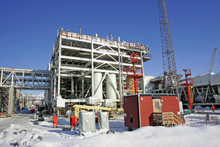
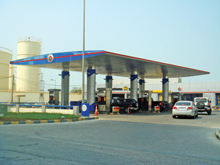
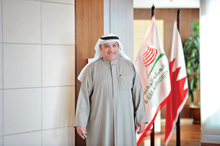
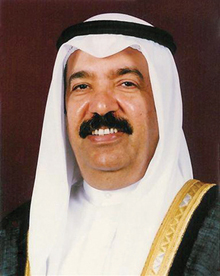
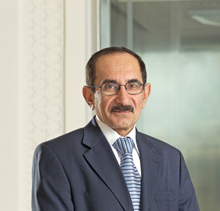
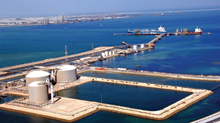
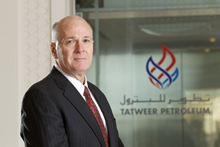
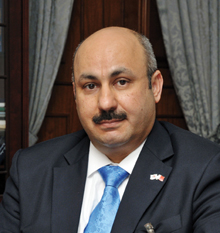
.jpg)
